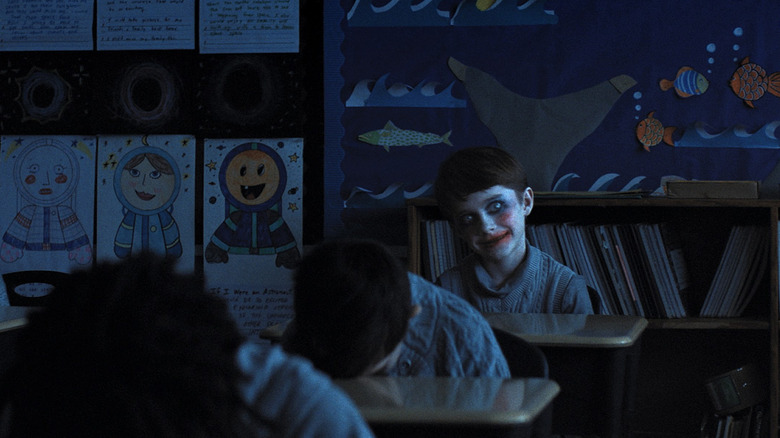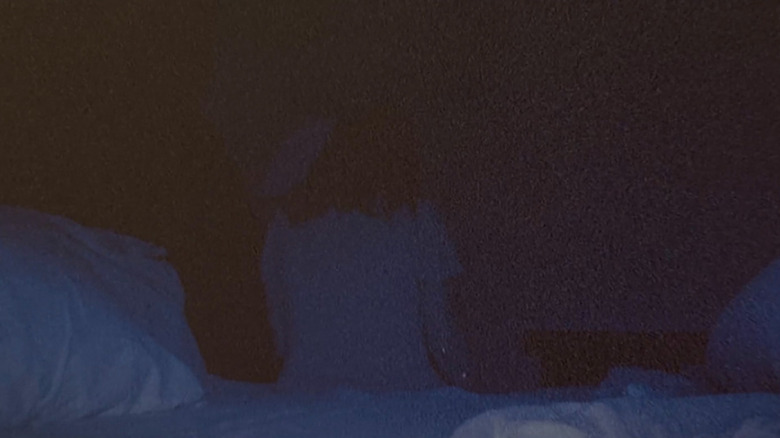Weapons' Scariest Ideas Echo A Misunderstood 2023 Horror Film
This article contains spoilers for "Weapons" and "Skinamarink."
The concept of a festering rot infecting a community due to its concealed existence is by no means revolutionary, but a good filmmaker can make it feel fresh and new. Enter "The Whitest Kids U'Know" co-founder Zach Cregger, who emerged as a promising new face in the world of horror with 2022's subterranean nightmare "Barbarian." Blending his comedic sensibilities with a demented horror movie about people discovering a labyrinthine sexual torture basement could have gone sideways in a whole number of ways, but Cregger pulled off a minor miracle. He provides moments of catharsis, albeit never at the expense of the horrors assaulting his most vulnerable characters. The bold twists and turns that "Barbarian" takes ensured my interest in whatever film Cregger would make next, and "Weapons" was well worth the wait.
/Film's Chris Evangelista gave a glowing review of "Weapons," accurately calling it "a twisted, funny and scary suburban nightmare." There's plenty to love about Cregger's solo sophomore feature, from its wicked sense of humor to its tense atmosphere and effective scares. The story of an entire class of children mysteriously waking up at 2:17 in the morning and disappearing without a trace is presented as a suburban fairy tale not unlike something out of a Stephen King novel. The town of Maybrook, Pennsylvania is uprooted by the lack of answers surrounding this mystery that hangs over their head like a storm cloud. Cregger employs a similar narrative structure to "Barbarian," showing multiple character perspectives and how they're dealing with the aftermath before bringing it all together in an insane finale.
For the first hour or so, we're just as much in the dark as Justine (Julia Garner), Archer (Josh Brolin) and Paul (Alden Ehrenreich), but eventually a new player reveals themselves: a show-stopping Amy Madigan as Aunt Gladys. Even though she only appears in one blink-and-you-miss-it shot in the trailer, Gladys' presence permeates the entirety of "Weapons." She's an enigmatic witch with a colorful wardrobe who's revealed to have orchestrated the children's disappearance by way of her young nephew Alex (Cary Christopher), the only student in Justine's class to not go missing. Alex's perspective goes into detail about how Gladys uprooted his entire life and forced him to become her accomplice.
The horror of grief and making sense of intangible answers takes on a much sinister form as "Weapons" transforms into a portrait of childhood abuse. Themes present within "Magnolia," "Picnic at Hanging Rock," and "The Shining" are all embedded within the film, but it also evokes a more recent horror movie that makes my skin crawl whenever I find myself in a dark space.
Weapons evokes the thematic strand of childhood abuse in Kyle Edward Ball's Skinamarink
Kyle Edward Ball's "Skinamarink" is a viscerally upsetting nightmare whose sensory terrors swallow you whole. It's not the easiest horror film to recommend as its polarizing experimental nature is all dependent on the mood, environment, and atmosphere you watch it in. I've often seen it described as a movie where nothing happens, which couldn't be farther than the truth. "Skinamarink" is a terrifying experience in childhood regression that's evil to its core. It forces the viewer to succumb to its lack of answers, establishing shots, or traditional narrative structure. But if you give into Ball's waking nightmare, you'll see plenty in the dark.
"Skinamarink" follows four-year-old Kevin (Lucas Paul) and six-year-old Kaylee (Dali Rose Tetreault) as they wake up in the middle of the night to discover that all the windows and doors have disappeared. They're stranded in the house, whose only real source of light is a television playing creepy public domain cartoons. You never see their faces, as Ball's camera is always capturing them from obscured, offkilter angles.
The coupling of white noise and nearly intelligible dialogue makes you feel as disoriented as these kids are. It all becomes even more unnerving, however, when a threatening disembodied voice starts speaking to them through the neverending darkness. It seems playful until it's very much not. Why? Because the shapeless form can do just about anything it wants. In the vein of "The Blair Witch Project," "Skinamarink" is not just one of the best horror movies of the 2020s, but one of the scariest movies I've seen period — in large part because it captures what it feels like to feel so helpless with no one coming to save you. The world is too big to comprehend and will strike (and strike hard) if it so feels like it
Part of what makes "Skinamarink" so interesting to dissect is its ambiguity. There is a story in there if you're paying attention, but there are a whole number of readings you could apply to it. One interpretation is that it's a horrifying meditation on childhood abuse by a parasitic figure who abruptly walks into the kids' lives by tormenting them within a space they can never leave. Sound familiar? "Weapons" may not be nearly as avant-garde as Ball's film, but the two do share a similarly distressing thematic throughline.
In this house...
The Lilly residence gradually reveals itself as the epicenter of "Weapons," with young Alex as its reluctant caretaker. Although the third act pretty much solves the mystery of who, where, what and why, an even greater horror emerges from the shadows with Gladys' takeover. She's the house guest from hell who can't seem to leave. Akin to "Skinamarink," Alex wakes up to discover that his loving parents (Whitmer Thomas and Callie Schuterra) are gone, not so much physically, but mentally. They're trapped in a frozen state in which all they can do is whatever Gladys has them do. Demonstrating the extent of her abilities (and what will happen in Alex doesn't play by her rules), she makes them repeatedly stab themselves in the face with forks. In "Skinamarink," Kaylee doesn't do as she was told, missing her mom and dad, so the entity removes her mouth — and therefore her agency. The doors and windows in "Weapons" may not disappear, but they are heavily coated in newspaper. Alex can walk outside of his house, but he can never truly leave its dominion. It's a different state of perpetual darkness.
Gladys exhibits all the traits of performing childhood abuse including, but not limited to, ostracizing Alex from having a potential social life, forcing him to be his parents' caretaker, having him lie when social service figures come to visit, and, most importantly, neglect. She even burdens him with the weight of responsibility for his entire class being lured to the basement. It's only through their continued hypnotic presence that she's able to rejuvenate her power. Cregger not so subtly conditions us to Gladys' devious nature, both with the "witch" tag painted on Justine's car and with the presence of parasites as a topic on the class syllabus. Gladys has latched onto not just Alex, but to the children and the grief they spread with their absence.
All of the other characters in "Weapons" are frantically searching for answers to a situation they can't even begin to grasp the extent of. That's where the film's horror comes from — that is, until we see the invisible scars of Alex's predicament. He may not be under Gladys' hypnosis, but is certainly as dead-eyed as his classmates in the basement. Justine can tell there's something off with her student, but initially can't see the terror festering within him.
"Weapons" wisely ends on a somber reminder that just because you rip a witch to shreds with your bare hands, that doesn't mean the physical and mental wounds immediately heal. We're all just visitors in one another's trauma. It very much echoes the emotional terror of "Skinamarink," which I feel would make it an excellent companion piece.
"Weapons" is now playing in theaters.


